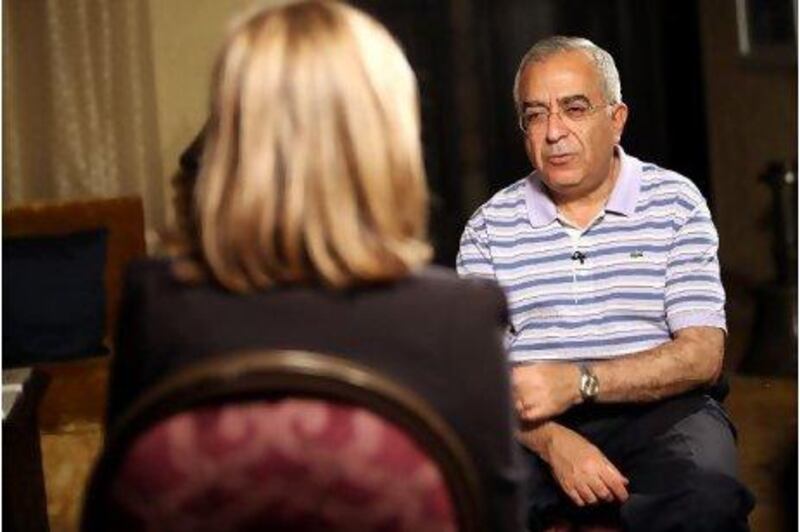QASR AL SARAB, ABU DHABI // The UAE has gone beyond its commitments in financial and political support for the Palestinian people, the Palestinian Authority's prime minister said.
"The UAE was, and still is, committed to providing all forms of assistance and help to the Palestinian people and the Palestinian Authority," Salam Fayyad said.
"What the UAE gave has exceeded in many areas what it had committed to. This assistance helped us carry out our development plans and fund our spending, and allowed the PA to fulfil its duties to the people in all areas including the Gaza Strip," he said on Saturday night.
Senior Arab officials also insisted the Palestinians would not return to negotiations until Israel halts settlement construction. They said the US administration was obliged to pressure Israel into stopping construction despite the Republican victory in congressional elections last week.
"The situation is difficult," Mr Fayyad said. "The primary reason is Israel's persistence in not complying with a clear and obvious issue."
A moratorium on settlement construction in the West Bank expired on September 26, weeks after direct negotiations sponsored by the US were launched. Talks have gone nowhere since then.
"The issue is completely stalled," said Amr Moussa, the Arab League's secretary general. Israel's actions in the occupied territories are changing those territories and complicating the situation, Mr Moussa said.
"The American administration was busy with the elections until two or three days ago," he said. "What is expected is that the American administration regains its energy in talking with the Israelis about the need to halt the settlements.
"Having settlements during negotiations is not acceptable. It doesn't serve the purpose. You are negotiating to form a nation, and the land of the nation is being eaten daily. In a year or two you will be forming a nation in the air because there is no land." Halting settlement construction is a "binding condition" to the resumption of peace talks, he said.
"If the American administration cannot stop the settlements, then it cannot manage meaningful negotiations, and there will not be negotiations to begin with while the settlements are ongoing," he said, echoing the sentiments of many Arab leaders.
The time has come for the international community to press for the policies of international law, rather than simply what is acceptable to Israel, Mr Fayyad said, especially since the Palestinians have adhered to their international agreements.
Holding Israel to similar standards should happen "regardless of who won or lost in the elections, that is a political process in the United States, and this is not the first administration without a majority in Congress", he added. "This does not create a reason in my mind at all for the US to not move forward in implementing what Barack Obama expressed a desire to happen."
At the UN General Assembly last month, the US president said he hoped to see a Palestinian seat there when it convened next year.
Mr Fayyad said the PA's "difficult and precarious" financial position has been eased but the financial woes were not over. Saudi Arabia donated about US100million (Dh367m) recently and the PA expects more aid.
The PA's financial strategy is aimed at reducing the reliance on foreign aid and reducing its deficit. In 2008, the aid needed to fund the PA's budget was $1.8 billion. In 2010, that figure does not exceed $1.2bn, Mr Fayyad said.
Mr Fayyad and Mr Moussa were speaking at the Sir Bani Yas Forum in Abu Dhabi, where the peace process was on the agenda.







